
by Mannahattamamma (UAE) | Dec 10, 2014 | Expat Life, Feminism, Gun Violence, News, Prejudice, Social Media, Tragedy, UAE, USA
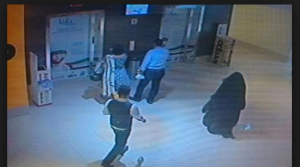 “Are you okay?” The emails and Facebook queries began pouring in even before I knew what had happened. “Were you there?” One particularly dramatic friend asked if “what happened” made me think about moving home.
“Are you okay?” The emails and Facebook queries began pouring in even before I knew what had happened. “Were you there?” One particularly dramatic friend asked if “what happened” made me think about moving home.
Their queries followed the terrible news that had gone viral almost as soon as it happened: in a mall bathroom in Abu Dhabi, where I live, a veiled woman had killed a Western woman—-an American teacher-—with a long kitchen knife. Adding to the horror of the attack was the fact that the victim’s children, eleven-year old twins, were apparently hanging out in the mall waiting for their mother to come back from the bathroom.
I didn’t hear the news until I got home from work that day and opened Facebook. I suppose that people were particularly worried because I am also an American teacher, and about a month ago, the US Embassy in Abu Dhabi reported that anonymous threats against American teachers had been made on a jihadi website. For a day or two after the attack, news reports tossed around the possibility that the veiled woman was somehow in league with ISIL, or some other terrorist organization.
As it happens, however, the murderer had no discernible terrorist allegiances, and what happened in that mall bathroom was just an appalling act of violence. Some of us who live here speculated about the difference between what happens in the US when an unstable person finds a weapon and what happened here:
a butcher knife is a brutal instrument, it’s true, but it creates far less mayhem than, say, a semi-automatic rifle.
According to a 2007 survey, the US ranks first in the list of number of guns owned by civilians (90 guns per 100 residents); the UAE ranks 24th (22 guns per 100).
Violent crime is incredibly rare in Abu Dhabi. Yet, despite the rarity of violence here, and despite the stability of the Gulf States, there was the chatter on Facebook; there were the emails; there were the questions about whether this attack would cause me to move home. “Home” is a bit complicated for me: I’ve lived in Abu Dhabi for almost four years, but had been in Manhattan for almost twenty years before that. So “home” is here. . . and there.
Before we moved to Abu Dhabi, my family and friends were worried about other things. “Are you going to have to, you know,” they’d ask, swirling their hands around their head as if describing the world’s biggest beehive hairdo. Their swirl implied “covering”: would I have to wear a headscarf or an abaya when I went out in public? The answer is no. I feel free to walk around alone wherever I please, dressed much the same way I would be in New York. There are no laws governing how people dress here; women are free to cover or not cover, and on the beaches you see burqas and bikinis with equal frequency.
In fact, I feel as safe walking alone in Abu Dhabi as I ever did in New York. It’s the kind of place where I leave the car doors unlocked when I run into the grocery store, and where more than once I’ve forgotten my phone in some public place, only to run back ten minutes later to find it exactly where I left it.
I share the sentiments of my local friend, Ken. In response to the news, he posted the following message on his Facebook page: “Thank you for your e-mails and messages about the American woman who was killed here on December 1st. I appreciate your concern. But please be assured that I don’t feel in any greater danger being a Westerner in Abu Dhabi than I felt being a gay man in New York City. In fact, it’s the opposite. I’m used to danger.
The only way to protect oneself completely from acts of terror or random violence is by not participating in the world. I won’t do that.”
The expressions of worry that came from my family and friends in the aftermath of this attack were real, I know. And there is no doubt that what happened is appalling and has ripped apart the lives of this woman’s family. But I can’t help but suspect that this story got as much coverage as it did (there are more than thirteen pages of hits for “American teacher slain Abu Dhabi) because the attacker is so visibly Other: a veiled woman, an exotic symbol of “the Middle East,” which to much of the West is still an undifferentiated blur of veils, oil rigs, and jihadis.
Here’s the teaser from CNBC when the story about the knife attack first broke:
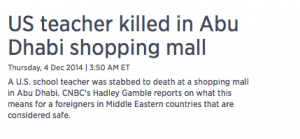
I wonder about the leap: that an attack in a mall bathroom by a woman with a knife might have implications for “foreigners” living anywhere in the Middle East.
It’s a strange twist, isn’t it, to think that had the Western media simply assumed that the attack was an isolated, horrifying incident—the work of one crazy woman—it might have represented a step forward?
This is an original post written for World Moms Blog by Deborah Quinn.
Photo Credit: Daily Mail
After twenty-plus years in Manhattan, Deborah Quinn and her family moved to Abu Dhabi (in the United Arab Emirates), where she spends a great deal of time driving her sons back and forth to soccer practice. She writes about travel, politics, feminism, education, and the absurdities of living in a place where temperatures regularly go above 110F.
Deborah can also be found on her blog, Mannahattamamma.
More Posts
Follow Me:


by Mannahattamamma (UAE) | Aug 27, 2014 | Human Rights, Humanitarian, Israel, Older Children, Politics, Religion, Terrorism, Tragedy, UAE, World Motherhood

Like many twenty-first century parents, I have ongoing battles with my kids about “screen time.” They think they don’t have enough of it; I think that if they stare any longer into a computer screen, they will start bleeding from the eyeballs. My thirteen-year old son P. generally spends more time with computer games than he does with Facebook, but when the always simmering tensions between Israel and Palestine exploded this summer, his Facebook page became a much more interesting, and complicated place that–surprisingly–ended up teaching us a great deal.

My son’s Facebook friends are pretty evenly split between his Manhattan friends and his Abu Dhabi friends, and they usually all post the same sorts of things: video clips from soccer games, Vines of stupid pet tricks, grimacing selfies, ridiculous quizzes. You wouldn’t know, to look at his page, who was from which city, other than perhaps from their sports-team affiliations.
In June, P.’s US friends began to post about the three Israeli teenagers who were kidnapped and killed. Then his Abu Dhabi friends began to post about the escalating violence in Gaza and suddenly, right there on P’s Facebook page was the knotty, terrifying, devastating sadness of the Israel-Palestine relationship.
Some of P’s New York friends are Jewish and some are not; some of his Abu Dhabi friends are Arabs, but most are not. The people who populate his page hail from almost every continent, regardless of the place they now call home. But pretty consistently, it seemed, the New York friends posted on behalf of Israel and the Abu Dhabi crew posted on behalf of Palestine. As each wave of articles washed across his page, P would first think one thing and then another: like all of us, he wanted clarity and answers. He wanted a clear apportioning of blame and swift justice; he wanted resolution.
At thirteen, my son and his friends are none of them too far removed from the realm of childhood, where everything is clear-cut, like in comic books and fairy tales. In those worlds, there are good guys and bad guys, heroes and villains, and usually the good guys win. It’s one of the hardest things about growing up, isn’t it, the realization that life doesn’t arrange itself into such tidy categories?
This summer is the first time that P has had to think about what it means to have a religious identity. When we lived in New York, all he saw is that some of his Jewish got eight days of Hanukah gifts while he only got one measly day of Christmas loot. This year P tried a few days of Ramadan fasting (a sort of Ramadan lite, in that he ate breakfast at the regular time but then ate nothing until after sunset) but all he seems to have learned is that being really hungry makes food taste better. As politics heated up on his page, however, he started to think more carefully about religion, and to consider not only the difference between religions but also their similarities.
The clashing views that appeared in P’s facebook feed led him to many conversations: why was Israel created and by whom, why did Israel have such strong US support, who drew the embattled boundaries and why, what is Hamas, who lived in Israel before it was “Israel?” The questions went on and on: how could Hamas use civilians as shields, how could Israel fire into supposedly protected spaces like schools and hospitals, and how could people kill in the name of religions supposedly dedicated to love and compassion? I found myself trying to unspool sixty years—a century—of politics and greed, from World War II backwards to 19th century English imperialism, and even further. I showed him this article, and this one, and many more. The more I talked, the more I realized that I was trying to explain the unexplainable: how does anyone, in any war, reach a point where violence against children gets, if not justified, then somehow discounted in the service of larger goals?
As the war ground on, P’s friends on both sides stopped posting and his Facebook page returned to its standard scroll of shark attacks and kitten pictures. But P kept scanning the newspapers, looking for the latest news about cease-fires—and the cessation of cease-fires. He asked me recently if I thought peace might be possible. I told him I wasn’t sure, which is a pretty grim message to give a thirteen-year old.
I don’t know when, or if, a livable resolution can be found for the conflict in Israel and Gaza—as my own explanations to my son showed me, the roots of the conflict run in tangled webs far below the surface of the present moment. What his Facebook page taught me, however, is that even if we ourselves aren’t in physical danger, the war between Israel and Palestine isn’t just their problem, it’s ours, as well.
This is an original post to World Moms Blog by Deborah Quinn in the United Arab Emirates of “Mannahattamamma.”
Photo Credit to: MKH Marketing
After twenty-plus years in Manhattan, Deborah Quinn and her family moved to Abu Dhabi (in the United Arab Emirates), where she spends a great deal of time driving her sons back and forth to soccer practice. She writes about travel, politics, feminism, education, and the absurdities of living in a place where temperatures regularly go above 110F.
Deborah can also be found on her blog, Mannahattamamma.
More Posts
Follow Me:


by Mannahattamamma (UAE) | May 21, 2014 | 2014, Awareness, Cultural Differences, Education, Expat Life, Feminism, Girls, Government, Human Rights, Nigeria, Politics, UAE, USA, Women's Rights
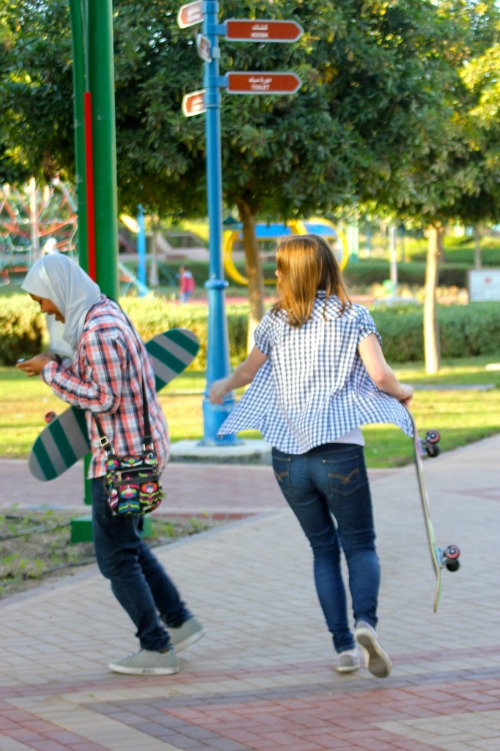
In March, I wrote a post in honor of Gloria Steinem’s birthday, in which I mentioned that when Steinem spoke at my college graduation way back in the 1980s, my friends and I had wished for a speaker who was more “relevant.” In our innocence, we believed that Steinem had won her fight; we were graduating from a women’s college and thought that fight for gender equality had been more or less won.
More than two decades later, I wish I could say that Steinem was irrelevant and that gender inequality is something we only read about in the history books.
When I wrote that post about Steinem, I was thinking about the Common Core curriculum, which relegates women’s contributions to history to the sidelines. Now, of course, we are all confronted with the horror that’s unfolding in Nigeria, and while the plight of those schoolgirls devastates me, it has become, in my mind, another instance in a long list of the ways in which groups (comprised mostly of men) attempt to score political points by seizing control of women’s lives. As an example, think about the Tea Party conservatives in the US, who prove their conservative bona fides in the United States by voting against support for Planned Parenthood, or Head Start, or universal kindergarten, or…
What is so scary about educating a girl? In the middle ages, accusations of witchcraft were often leveled against women who had amassed too much wealth or land, or who in some way differed from those around them. We teach our children that things like the Salem witch trials happened because “people didn’t know better” or because of “mass hysteria” but sometimes I wonder how far we have progressed since those days. What happens to women who challenge the status quo–or who have the potential to challenge the status quo? Don’t they still run the risk of being punished, whether literally or figuratively?
It’s funny to me now, but when I first moved to Abu Dhabi the two most obvious indications that we’d left Manhattan behind—besides the searing heat—were the adhan and the abaya-clad women: religion and covered bodies. I found the abayas more unsettling than the call to prayer, even as I sometimes envied the women their public invisibility. The longer we live here, however, my perceptions have changed so that I no longer see hijab as an automatic symbol of oppression or subjugation or second-class citizenry.
I would imagine, however, that as women here, we’ve all had moments where we’ve felt marginalized, silenced, lesser: the day I trotted down the sidewalk to get in a waiting cab and the cab driver chastised me by saying “women should not run, madam, I will wait, and you should walk.” Or when a guard at the border crossing into Oman looked over at the passenger seat where I was sitting (in long trousers) with one foot propped on the dashboard and told me “to put my foot down, sit like a lady, more properly, sit properly.” When that happened my first impulse was to laugh: surely he couldn’t be serious? But, of course, he was serious. I put both feet on the floor and looked at the map so that I didn’t toss out a few well-chosen swear words. (A general rule regardless of where you are: don’t swear at anyone, male or female, who is wearing a uniform at a border crossing.)
So yes, in that instance, I was silenced as I suppose I was by the cab driver too, who took it upon himself to offer some unsolicited advice. And yes, there is now a slight internal pause before I leave the house as I run through a kind of inner checklist about what I’m wearing: if short sleeves, a long skirt or pants, or vice versa (long sleeves, shorter skirt or shorts); do I have a shawl (equally for frigid air conditioning and bare shoulders); if I’m going to the beach, I make sure that my beach cover-up is more than a ratty t-shirt. There are days where I know I’ve failed the checklist and am too busy or late to care, but overall, I dress more modestly now than I used to and probably that’s not a bad idea: no one needs to see a fifty-year-old woman slopping down the street in cut-off shorts and a tank top.
Am I being repressed, or respectful? Does my feminism mean that I yell at the cabbie, keep my foot defiantly on the dashboard, saunter down the street in a halter top and tight jeans? Or, alternatively, does feminist politics remind us that silencing and the policing of women’s bodies happens—sadly—in almost every culture in the world, including the US? Without making light of the specifics of being female in this region, I’ve come to think of the issues facing women in this part of the world as being differences in degree, not kind, from the problems facing women in other parts of the world.
What do we, as women, do to help other women and girls find their voices–find our own? How do we create strength to silence those who would silence us?
This is an original post to World Moms Blog by Deborah Quinn in the United Arab Emirates of “Mannahattamamma.”
After twenty-plus years in Manhattan, Deborah Quinn and her family moved to Abu Dhabi (in the United Arab Emirates), where she spends a great deal of time driving her sons back and forth to soccer practice. She writes about travel, politics, feminism, education, and the absurdities of living in a place where temperatures regularly go above 110F.
Deborah can also be found on her blog, Mannahattamamma.
More Posts
Follow Me:


by Mannahattamamma (UAE) | Mar 19, 2014 | 2014, Computers, Cultural Differences, Culture, Education, Expat Life, Government, Homeschooling, Living Abroad, Multicultural, Older Children, Politics, Religion, School, Social Media, Traditions, UAE, USA
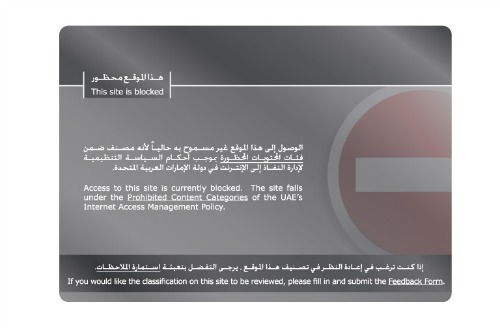 I always swore I would never home-school my children. I know many people do, and do it quite successfully, but I’m awfully fond of the quiet that descends on my house after they’ve tromped off to school. If that tromping were only happening from the bedroom to, say, the kitchen table, I think I might simply lock myself in the bathroom and never come out.
I always swore I would never home-school my children. I know many people do, and do it quite successfully, but I’m awfully fond of the quiet that descends on my house after they’ve tromped off to school. If that tromping were only happening from the bedroom to, say, the kitchen table, I think I might simply lock myself in the bathroom and never come out.
But as so often happens, my vow has collided with reality and I have found myself, in recent weeks, trolling home-schooling websites in search of teaching resources. My kids are now 9 (nine and a half, he would say indignantly) and 13; they go to a British school here in Abu Dhabi. That means they’ve spent a lot of time learning various English kings and queens, although they can’t recite them all in order. They study “maths,” and do prep rather than homework; they study English history and geography; they read mostly English writers in their literature classes. In addition to all those Anglo studies, they take Arabic language classes four days a week and once-weekly class called “Islamic Studies.” The Arabic classes are mandated by ADEC (Abu Dhabi Education Council) and I have to say, I’m much more interested in my kids learning Arabic than I am in their ability to name all the English kings and queens.
Having the boys be in an English system has been a learning curve for all of us. We’re learning two languages, actually, Arabic and, well, English: the boys now live in a world where things are “grey,” luggage goes in the “boot,” and we put garbage in the “bin.”
I’m not considering a dabble in the home-schooling system in order to beef up my boys’ appreciation of the Queen’s English, however. My kids, like every schoolchild in the country, have a curriculum that is at least in part determined by the UAE government, and that means there are things that aren’t supposed to be taught. I live in a place where censorship happens and where, unlike the States, the policies cannot be overtly challenged in the courts. So, for instance, in the States if you live in a town where they want to ban the Harry Potter books, you can take the school district to court. Not here.
We had to sign a permission slip so that our older son could get the science textbook that included the chapter on reproduction (with pictures of, you know, the embarrassing bits); his Latin class translates vinum as … grape, not wine. These are relatively small annoyances, although of course they are far from ideal.
There are, however, more serious concerns in terms of what shouldn’t be included in history courses and literature courses, and that’s where I find myself trolling the home-schooling sites for resources. The Holocaust can’t be taught here; Israel and Judaism are not supposed to be mentioned here; communism isn’t supposed to be discussed; evolution isn’t supposed to be taught; and the list goes on. Sometimes it feels as if we’re living in some kind of Bible-thumping town in the rural U.S and I realize, yet again, that fundamentalism can be seen as a global phenomenon that differs only in the nature of its prohibitions: the fear that motivates the prohibitions stays constant.
Before you leap to any conclusions, please know that the Muslim families I know are as frustrated by these government-issued edicts as are the non-Muslim families and many of us have talked together about what we can do to help our children gain a full picture of the world, regardless of what the government says. So it is that what in some contexts (living in Manhattan, for instance) would be a purely theoretical discussion has become in our household, a very pragmatic series of conversations.
Think about it: how would you talk to your kids about censorship? Is censorship always bad? Think about your children, if you have them, and the internet: are there sites you say they can’t see, or have you put a filter or something on your computer to prevent certain kinds of access? Do we agree that there is such a thing as “good” censorship? (Because of that whole teenage-boy-surfing-the-internet thing, I see a (slight) upside to living in a “nanny state.” I am fairly sure that if he wanted to look, my son wouldn’t be able to find basic porn–not to say that if he really wanted to dig around he couldn’t elude the censors, but at this point, I think his porn-directed vocabulary is still too limited to get around the government blocks. I guess we file that under “thank goodness for small favors,” right? )
My husband and I are both professors, and so we are able to bolster and supplement what isn’t happening in school, but we are also having a lot of conversations with our kids about censorship, politics, and the necessity of thinking about things in ways that are different from how we might think about them. We point out that the UAE isn’t Saudi Arabia; there is no Taliban here; the country is not governed by a theocracy of any sort. We know Jewish families who live here; I know gay couples who live here; a Mormon family lives next door to us. I see people on the beach in the scantiest of scanty bathing suits.
Living here means coming to term with nuance, with ambiguity, with living in a world that is organized around “both/and,” rather than “either/or.” The country is progressive and conservative; censorship is a problem that has a context; learning happens as much from what is not there as it does from what is there. It’s complicated and let’s be honest — no nine year old, no thirteen year old—and very few adults—really likes ambiguity. After all, if there is no “in-between” answer, life becomes much easier, doesn’t it?
No, of course I’m not happy that my kids have a biology textbook with the word “pig” marked out. Of course, I’m also not pleased that the Anglo-centric curriculum also neglects things like the US Civil War, other than in the most general sense. But I will say that I think it is, and will continue to be, a powerful learning experience for my children (and us) to have to confront and think about what it means to live in a place where the government attempts to exert such extensive control. I like to think that, paradoxically, these attempts at censorship will make my children more open-minded adults.
Have you ever been confronted with censorship? How have you dealt with it?
After twenty-plus years in Manhattan, Deborah Quinn and her family moved to Abu Dhabi (in the United Arab Emirates), where she spends a great deal of time driving her sons back and forth to soccer practice. She writes about travel, politics, feminism, education, and the absurdities of living in a place where temperatures regularly go above 110F.
Deborah can also be found on her blog, Mannahattamamma.
More Posts
Follow Me:

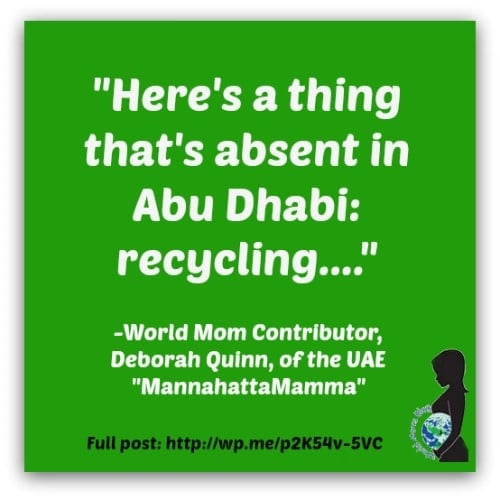
by Mannahattamamma (UAE) | Feb 12, 2014 | 2014, Education, Expat Life, Older Children, UAE, World Motherhood

I turned fifty last month.
See how calmly I said that? Just rolled right off my keyboard with nary a omigodhowdidigetsoold freakout.
Turning fifty in Abu Dhabi, where we’ve lived for the past three years, meant that my family couldn’t be with me to celebrate this milestone (millstone?). On the other hand, celebrating here in a place that still feels quite “new,” reminds me that I’ve avoided one of the big pitfalls of late middle age: falling into a rut. As a wise friend here pointed out to me, when you’ve just upped stakes and settled in a new country, culture, city, you’ve pretty much blown the “rut” wide open.
I’ve gotten used to many new things over our years here–buying Pop-tarts in the “pork room,” Sunday as the start of the work-week, no door-to-door postal service–but there are other things that feel more difficult to resolve, particularly when I think about what my kids are (or aren’t) learning as a result of living here. As with all things, of course, we start to figure out what really matters to us, as parents and as people, when we’re confronted with the absence of that thing.
Here’s a thing that’s absent in Abu Dhabi: recycling. Think about that for a minute, especially those of you who live in the US: think about the fact that it’s become almost second nature to separate your garbage, to flatten the cardboard, take the empty bottles back to the store, to look for products in environmentally-conscious packaging (unless that triples the price in which case…hmm…).
Not here. Oh sure, there are some “recycle” bins in public places, and in the housing development where we live, we have two garbage bins: one for “wet” garbage and one for “dry,” but we’ve watched as both bins get dumped, day after day, into the maw of the same truck. Plastic water bottles are ubiquitous but there isn’t anywhere to recycle them (which will explain why there are about 75 of them under my sink right now–and I think they’re breeding); gas-guzzling SUVs are the norm; and while there is talk about developing solar power here (in the land of eternal sunshine and heat you’d think that would be a no-brainer), nothing as yet has happened.
I use many of these problems as “teaching moments,” trying to explain to my kids about the importance of being environmentally conscious, but it’s been difficult to put anything into action, unlike when we lived in New York, where we took our compost to the farmer’s market to be turned into worm food, separated our trash, and so on.
And then for my birthday, my husband surprised me with two boxes. One was very small and contained things that sparkled. That box was just for me. The other box, much bigger and bulkier, contained a big plastic tub. Much less romantic, perhaps, but a gift for the whole family to–if not enjoy, then at least participate in: Bokashi.
Bokashi is a Japanese word that means fermentation, and bokashi is a method of composting food waste by sprinkling the scraps with “bokashi bran,” which encourages the fermentation process.
All our food scraps (meat, cheese, bread, coffee grounds) go into the bokashi bucket and when the bucket is full, we bury the contents of the bucket in our backyard (although there are other options; see the website for details).
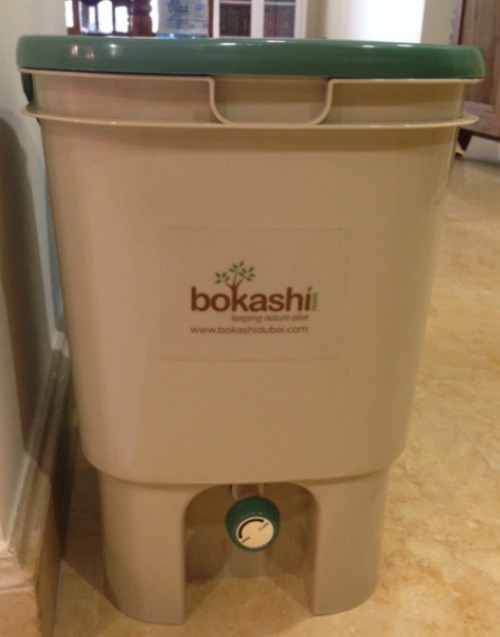
Now my kids have an additional chore: they are the food scrap patrol. Uneaten contents of lunchboxes don’t get dumped at school; they go into the bokashi. Dinner scraps, lunch bits, residue in cooking pots: bokashi, bokashi, bokashi. Not only does composting in this fashion show my boys how much food we throw away and (I hope) make them more mindful about food waste, the process going on inside the bucket is like an ongoing science lesson: molds and other micro-organisms, all right there in the kitchen bucket.
Will this at-home recycling help Abu Dhabi resolve its recycling crisis? Of course not, but at least we are teaching our children (I hope) that everyone can do a small something — and that if enough people do a small something, a Big Something might result. And that’s not a bad lesson –for kids or for fifty year olds.
Is recycling the norm in your country? What do you do to go “green” in your country?
This is an original post to World Moms Blog by Deborah Quinn in the United Arab Emirates of “Mannahattamamma.”
After twenty-plus years in Manhattan, Deborah Quinn and her family moved to Abu Dhabi (in the United Arab Emirates), where she spends a great deal of time driving her sons back and forth to soccer practice. She writes about travel, politics, feminism, education, and the absurdities of living in a place where temperatures regularly go above 110F.
Deborah can also be found on her blog, Mannahattamamma.
More Posts
Follow Me:


 “Are you okay?” The emails and Facebook queries began pouring in even before I knew what had happened. “Were you there?” One particularly dramatic friend asked if “what happened” made me think about moving home.
“Are you okay?” The emails and Facebook queries began pouring in even before I knew what had happened. “Were you there?” One particularly dramatic friend asked if “what happened” made me think about moving home.















